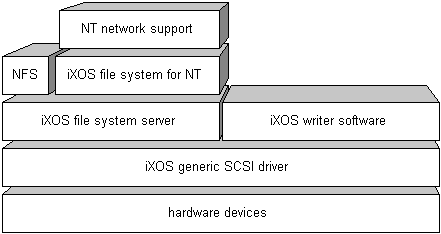
iXOS-JUKEMAN consists of a file system
server and a writer
for optical disks (CDs, PDs, WORMs, MOs).
The server provides native file system support for multiple client
types, and allows users to view disks in their preferred file system format. It
accesses hardware devices and hides them completely by presenting an abstract
hierarchical file system. It caches files and directories, optimizes access to
disks and jukeboxes, and minimizes jukebox movements.
The writer supports burning ISO 9660 file systems on recordable disks,
assuring the reliable constant data rate required by CD recorders. In addition,
the writer supports Rock Ridge attributes and the Joliet file format.
Version 2.3 of iXOS-JUKEMAN combines the server and writer in an incremental
file system.
It can be configured to present all writable disks as if they were hard disks,
allowing clients to add data to these disks through the same file system
interface that presents the disks for read access.
iXOS-JUKEMAN uses one generic SCSI driver
for all hardware related software products and for all operating systems. A
device that works under one operating system will work equally reliably under
all other supported operating systems.
The NT version includes "Jukeman Administration", a graphical user
interface (GUI) that makes administration available from any PC, whether
local or remote.

The
iXOS-JUKEMAN server controls jukeboxes, disk drives, and the disks they
contain. The server combines all disks in a single file system in which each
disk is a subdirectory of the root directory and the jukeboxes are hidden.
NFS
UNIX clients access the server's file systems via NFS. The server accepts
NFS requests and replies with the NFS protocol (version 2). Clients mount the
file system just like any other Network File System.
Windows NT
file system
With Windows NT, iXOS-JUKEMAN includes a native file system that appears as
a drive letter and can be accessed and shared through the file system server.
This guarantees that the same jukeboxes are supported across both the NFS and
NT file system interfaces.
Because NT shares local native file systems across all installed protocols, PCs
can access the file system as easily as they access a network drive. The same
file system can simultaneously be accessed by UNIX clients via NFS.
iXOS-JUKEMAN supports the MacFile service, allowing Macintosh clients to access
the file system.
optimized access
IXOS JUKEMAN optimizes jukebox performance by caching, optimizing disk
movement, parallel access to all devices, advanced queuing, and "request
anticipation". iXOS-JUKEMAN also recognizes hard disk images as disks -
allowing them to be used as replacements for disks drives. Using the file
system compression feature that is built in Windows NTFS, single hard disks can
replace large numbers of CDs.
For very high performance demands, disks can be replicated across several
jukeboxes. When a disk is requested the server automatically chooses the
jukebox, that has the lightest load.
The
iXOS-JUKEMAN writer
can send either ISO 9660 file systems or raw data to a disk recorder. Rock
Ridge attributes or the Joliet format can be used. The writer accepts data from
a pre-mastered file, a raw partition, a disk drive, or from a pipe.
The writer's preview mode can be used to test the writing process before it is
started. The verify option allows the CD to be verified immediately after it is
written.
incremental file system
A special feature of iXOS-JUKEMAN is that the file system can also be used by clients to write to disks. Thus, iXOS-JUKEMAN supports an incremental file system for writable disks. To eliminate the high overhead of session lead-in and lead-out, iXOS-JUKEMAN provides multi-track writing which uses the CD space more efficiently than multi-session writing. Up to 96 of the 99 tracks of a CD-R can be written with data. For PDs, WORMs, and MOs, the number of tracks is not limited.
iXOS-JUKEMAN
provides support for a wide range of devices including jukeboxes, stand-alone
CD-ROM drives and hard disk drives across multiple operating systems.
To minimize the non-portable sections of the drivers, iXOS-JUKEMAN uses a
generic SCSI driver
that passes a SCSI command to the hardware through the operating system.
If a generic driver is not present, the iXOS generic driver must be installed.
Once the driver is installed, it works with all iXOS products.